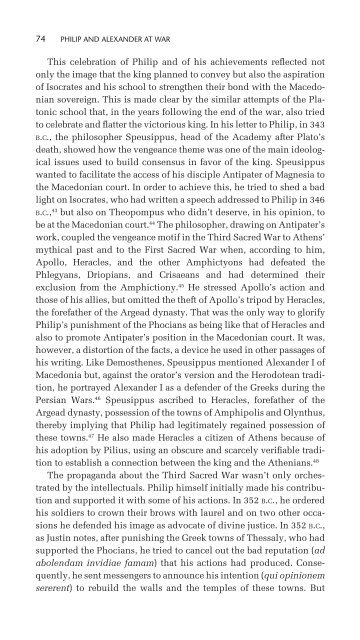Philip II and Alexander the Great: Father and Son ... - Historia Antigua
Philip II and Alexander the Great: Father and Son ... - Historia Antigua
Philip II and Alexander the Great: Father and Son ... - Historia Antigua
You also want an ePaper? Increase the reach of your titles
YUMPU automatically turns print PDFs into web optimized ePapers that Google loves.
74 PHILIP AND ALEXANDER AT WAR<br />
This celebration of <strong>Philip</strong> <strong>and</strong> of his achievements refl ected not<br />
only <strong>the</strong> image that <strong>the</strong> king planned to convey but also <strong>the</strong> aspiration<br />
of Isocrates <strong>and</strong> his school to streng<strong>the</strong>n <strong>the</strong>ir bond with <strong>the</strong> Macedonian<br />
sovereign. This is made clear by <strong>the</strong> similar attempts of <strong>the</strong> Platonic<br />
school that, in <strong>the</strong> years following <strong>the</strong> end of <strong>the</strong> war, also tried<br />
to celebrate <strong>and</strong> fl atter <strong>the</strong> victorious king. In his letter to <strong>Philip</strong>, in 343<br />
B.C., <strong>the</strong> philosopher Speusippus, head of <strong>the</strong> Academy after Plato’s<br />
death, showed how <strong>the</strong> vengeance <strong>the</strong>me was one of <strong>the</strong> main ideological<br />
issues used to build consensus in favor of <strong>the</strong> king. Speusippus<br />
wanted to facilitate <strong>the</strong> access of his disciple Antipater of Magnesia to<br />
<strong>the</strong> Macedonian court. In order to achieve this, he tried to shed a bad<br />
light on Isocrates, who had written a speech addressed to <strong>Philip</strong> in 346<br />
B.C., 43 but also on Theopompus who didn’t deserve, in his opinion, to<br />
be at <strong>the</strong> Macedonian court. 44 The philosopher, drawing on Antipater’s<br />
work, coupled <strong>the</strong> vengeance motif in <strong>the</strong> Third Sacred War to A<strong>the</strong>ns’<br />
mythical past <strong>and</strong> to <strong>the</strong> First Sacred War when, according to him,<br />
Apollo, Heracles, <strong>and</strong> <strong>the</strong> o<strong>the</strong>r Amphictyons had defeated <strong>the</strong><br />
Phlegyans, Driopians, <strong>and</strong> Crisaeans <strong>and</strong> had determined <strong>the</strong>ir<br />
exclusion from <strong>the</strong> Amphictiony. 45 He stressed Apollo’s action <strong>and</strong><br />
those of his allies, but omitted <strong>the</strong> <strong>the</strong>ft of Apollo’s tripod by Heracles,<br />
<strong>the</strong> forefa<strong>the</strong>r of <strong>the</strong> Argead dynasty. That was <strong>the</strong> only way to glorify<br />
<strong>Philip</strong>’s punishment of <strong>the</strong> Phocians as being like that of Heracles <strong>and</strong><br />
also to promote Antipater’s position in <strong>the</strong> Macedonian court. It was,<br />
however, a distortion of <strong>the</strong> facts, a device he used in o<strong>the</strong>r passages of<br />
his writing. Like Demos<strong>the</strong>nes, Speusippus mentioned Alex<strong>and</strong>er I of<br />
Macedonia but, against <strong>the</strong> orator’s version <strong>and</strong> <strong>the</strong> Herodotean tradition,<br />
he portrayed Alex<strong>and</strong>er I as a defender of <strong>the</strong> Greeks during <strong>the</strong><br />
Persian Wars. 46 Speusippus ascribed to Heracles, forefa<strong>the</strong>r of <strong>the</strong><br />
Argead dynasty, possession of <strong>the</strong> towns of Amphipolis <strong>and</strong> Olynthus,<br />
<strong>the</strong>reby implying that <strong>Philip</strong> had legitimately regained possession of<br />
<strong>the</strong>se towns. 47 He also made Heracles a citizen of A<strong>the</strong>ns because of<br />
his adoption by Pilius, using an obscure <strong>and</strong> scarcely verifi able tradition<br />
to establish a connection between <strong>the</strong> king <strong>and</strong> <strong>the</strong> A<strong>the</strong>nians. 48<br />
The propag<strong>and</strong>a about <strong>the</strong> Third Sacred War wasn’t only orchestrated<br />
by <strong>the</strong> intellectuals. <strong>Philip</strong> himself initially made his contribution<br />
<strong>and</strong> supported it with some of his actions. In 352 B.C., he ordered<br />
his soldiers to crown <strong>the</strong>ir brows with laurel <strong>and</strong> on two o<strong>the</strong>r occasions<br />
he defended his image as advocate of divine justice. In 352 B.C.,<br />
as Justin notes, after punishing <strong>the</strong> Greek towns of Thessaly, who had<br />
supported <strong>the</strong> Phocians, he tried to cancel out <strong>the</strong> bad reputation ( ad<br />
abolendam invidiae famam) that his actions had produced. Consequently,<br />
he sent messengers to announce his intention ( qui opinionem<br />
sererent) to rebuild <strong>the</strong> walls <strong>and</strong> <strong>the</strong> temples of <strong>the</strong>se towns. But

















